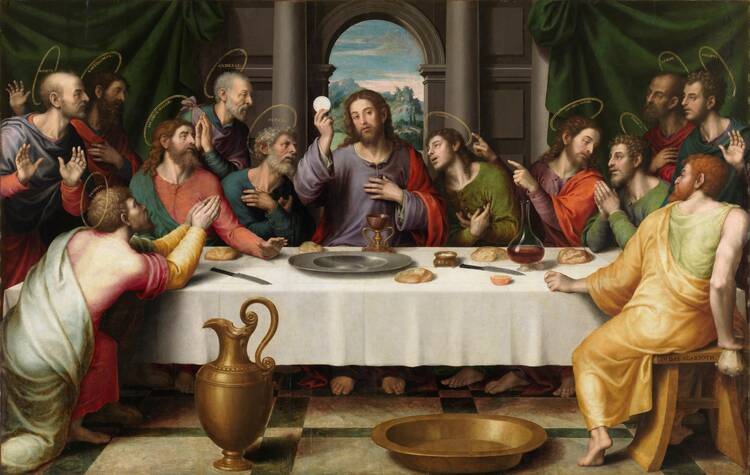Is there a lovelier, more compelling line of Scripture? It opens the supper, where we lay our scene: “He loved his own in the world and he loved them to the end” (Jn 13:1).
The Greek term telos, which we translate with our English word end has at least three layers of meaning. Certainly, it says that Jesus loved his own until the last moment of his mortal life.
It also means that he loved them fully, holding nothing back. On this night, before he dies, he does not leave them with ideas or memories or aspirations. He leaves them with the gift of his very self. He serves a meal in which he offers his body and blood to the Father, giving the same to us.
The core of the church is contained in these words of Christ: “Where two or three are gathered together in my name, there am I in the midst of them” (Mt 18:20).
We have been driven to a time of transmitting images of the Eucharist through all the media that technology has given to us. Let us admit that this is all that we do: transmit images and ideas. We cannot broadcast the reality that is the Eucharist because it is more than images and ideas. It is the Lord’s sacred supper.
Sadly, we are held captive. We can communicate with the outside world, but we do not have true human communion with all those whom we love. We cannot because we are more than ideas and images. We are glance, posture, touch, caress, embrace, kiss, scent and taste. We share ourselves in the spaces we select, keeping our distance or coming close. That decision makes all the difference.
Because Christ chose to remain among us in the very human mystery we call the church, we have been curtailed by the coronavirus pandemic. For the core of the church is contained in these words of Christ: “Where two or three are gathered together in my name, there am I in the midst of them” (Mt 18:20). The church must gather, must be collected by the call of Christ in order to fully be the church. Ideas and images can be collated when and where we like. Human bonds are here, not there. Now, not then. In sacraments, Christ gives himself to us. As in his incarnation, he accepts the limits of the human and seeds it with the sacred.
Christ gave everything until the end. While he drew breath he gave. With his last drop of blood, he gave. In the Eucharist, in the mystery of the church summoned and signed by his supper, Christ still gives himself.
This is why confessions cannot be heard over the phone and why only bishops and priests can anoint the sick. Gathering is the very nature of the church, and the sacrament of Holy Orders exists as a way of identifying where the church is and what the church does in the here and now. The church does not become present because someone snatches her Scriptures and claims to shepherd in the name of Christ.
Nor is the mystery of the church sheltered in statues and holy water, flown aloft by planes or paraded on pickups. A monstrance truly contains the consecrated presence of Christ, but it is not a talisman turned toward a crisis. It is a statement, a promise of Christ’s presence among us.
There is yet a third meaning contained in that Greek word telos. It also means “goal” or “final purpose.” Jesus loved his own to the very end of his mortal life. He loved them fully, giving all. If you find it incomprehensible that his body and blood is given to us—and you should, given the magnitude of the mystery—then ponder his washing of feet. It is a graced gesture, revealing who he is and what he gives.
Christ gave everything until the end. While he drew breath he gave. With his last drop of blood, he gave. In the Eucharist, in the mystery of the church summoned and signed by his supper, Christ still gives himself. Calvary and the holy Communion that resurrection calls from it is the consummation of our cosmos. Here all has been returned to the Father; here mercy is revealed. “For as often as you eat this bread and drink the cup, you proclaim the death of the Lord until he comes” (1 Cor 11:26).
Readings: Exodus 12: 1-8, 11-14 1 Corinthians 11: 23-26 John 13: 1-15










